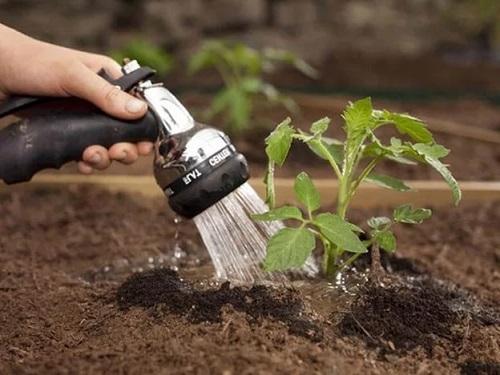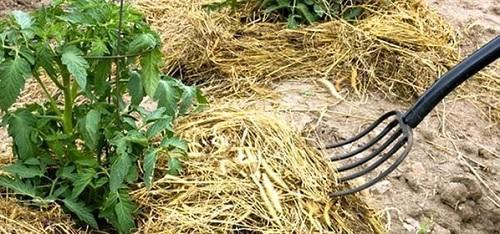Care of tomato seedlings after planting in the ground
A good harvest of tomatoes depends not only on strong seedlings. Timely measures for the care of young plants also play an important role. Indeed, with a lack of moisture or nutrition, tomatoes can not only get sick, but even die.
Caring for tomato seedlings after planting in the ground includes:
- watering;
- loosening the soil;
- hilling seedlings;
- mulching;
- fertilizing plants;
- the formation of tomatoes.
Watering after planting and during the growth of bushes

When transplanting seedlings into open ground, the holes are watered abundantly, so the next 1.5-2 weeks the plants do not need additional moisture, they are quite enough for them.
In the future, you should only keep the soil under the bushes in a moist state, watering it as it dries up until the beginning of fruit setting. But from this moment, tomatoes require more frequent watering so that the soil constantly has the same moisture. Its drops can provoke the onset of diseases, a stop in the growth of green fruits or a violation of the integrity of the shell of ripe tomatoes.
Watering tomatoes is necessary in the evening, directing the water strictly to the root. Plants get sick from drops on the leaves.
Loosening and hilling

To provide air access to the root system after each watering, be sure to loosen the soil around the bushes, while removing weeds. In this case, the loosening depth is:
- up to 12 cm - at the first loosening;
- up to 5 cm - with the further implementation of the procedure.
Hilling bushes is necessary when adventitious roots appear on the main stem. This process improves the development of the entire root system, enriches the soil with oxygen and helps to retain moisture after watering.
During the season, tomatoes are recommended to spud at least 2 times.
Mulching row spacings

Laying mulch in the space between the rows of planted tomatoes will reduce the amount of watering and will bring the ripening of the tomato closer. As mulch you can use green manure, rotted sawdust, straw or peat. Mulch prevents not only rapid evaporation of moisture, but also the appearance and reproduction of weeds.
Top dressing tomato

To provide plants with nutrients, 4 dressings should be carried out:
- the first - 21 days after transplanting seedlings to the garden;
- the second - when blooming the 2nd flower brush;
- the third - when blooming the 3rd brush;
- the fourth - 14 days after the previous feeding.
As a fertilizer for tomatoes, it is good to use infusion of bird droppings, Bordeaux mixture, wood ash, urea, superphosphate.
Plant formation

Most tomatoes need pinching or pinching, especially tall and large-fruited varieties. This contributes to the growth of fruits and accelerates their ripening. You can form a bush in 1, 2 or 3 stems. After pinching, at least 5 brushes with fruits and 30 leaves should be left on the plant.